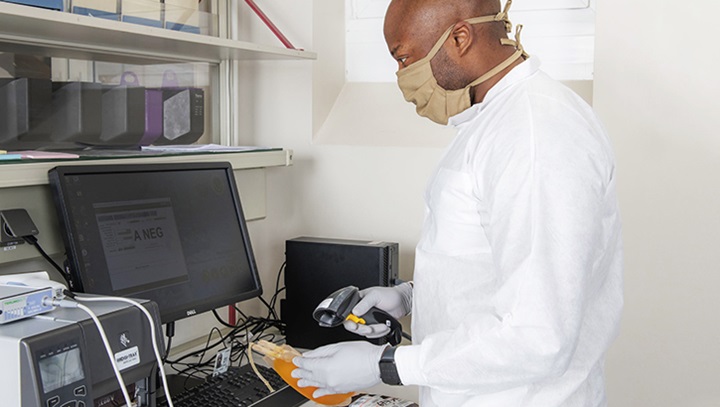The Department of Defense has set a goal to collect more than 8,000 donated units of plasma from patients who have recovered from COVID-19 by Sept. 30, 2020. This blood will be used to treat critically ill patients and support the development of an effective treatment against the disease.
Like a missile locking on its target, antibodies attack invaders inside the body with a singularity of purpose: search and destroy. Typically, infection-fighting white blood cells produce antibodies as an appropriate response to an invading germ. In some people whose immune systems can’t mount a sufficient attack against a virus, donated antibodies from another person’s plasma may help.
Researchers believe the power of antibodies lies in their ability to bind to a virus and neutralize it, or block it from entering cells, said Dr. Kayvon Modjarrad, director of the Emerging Infectious Diseases Branch at the Walter Reed Army Institute of Research in Silver Spring, Maryland. Modjarrad leads the Army’s COVID-19 vaccine development research.
But not all antibodies are created the same. “Antibodies come in different flavors, some of them are neutralizing and some of them are non-neutralizing and we don’t know exactly which individuals are developing what type of antibody,” said Shelly Krebs, chief of B Cell Biology Core at WRAIR Military HIV Research program.
COVID-19 convalescent plasma, or CCP, from a recovered patient could be a mixture of both neutralizing and non-neutralizing antibodies. In fact, people infected with COVID-19 can have varying antibody responses. Some may not have enough antibodies in their plasma to benefit another patient, which is why CCP first needs to be tested for neutralizing antibody levels before transfusing, explained Modjarrad. His lab works to understand the mechanism of COVID-19 antibodies to predict the levels required to offer a person protection from the virus.
Transfusing antibodies provides short-term immunity as the donor antibodies last several weeks to months inside the body, said Navy Capt. (Dr.) Todd Gleeson of the Navy Bloodborne Infection Management Center, located at Naval Support Activity Bethesda, Maryland. “It is likely that a person with COVID-19 who receives CCP will also still develop their own immune cells and produce antibodies to fight the virus if that person is re-exposed in the future,” said Gleeson, who leads a convalescent plasma study of patients at Walter Reed National Military Medical Center also at NSAB in Bethesda.
But scientists just can’t confirm that yet. They hope to uncover the answer and many more as they study CCP and COVID-19 antibodies to better treat patients and develop future vaccines.
Military medical treatment facilities will soon take part in an observational study across the Department of Defense to help researchers track trends among patients with COVID-19. The data will help trace recovered patients to ask for CCP donations as the DoD seeks to build a storehouse of CCP for patients admitted to Military Health System facilities and those deployed outside the U.S., explained Army Col. (Dr.) Andrew Cap, director of research at the Army Institute of Surgical Research in San Antonio, Texas. “The goal is to build a convalescent plasma capability within the DoD, both on the collection and on the treatment side,” said Cap, who helped draft a CCP protocol for the DoD.
Future research may lead to the development of highly concentrated neutralizing antibodies extracted from large quantities of convalescent plasma as a potential therapy for prevention and treatment, added Cap.
Scientists believe monoclonal antibodies—derived from a single immune cell—may also hold potential as both a treatment and preventive measure against COVID-19. Krebs and her team have engineered monoclonal antibodies in the lab by isolating the best neutralizing antibodies from CCP samples to create an army of exact replicas that target the COVID-19 virus down to the atomic level, explained Modjarrad. “We know where and how well it’s going to target, and we know the kinetics of how long it will last in the body and how long it will provide protection,” he explained, noting convalescent plasma does not provide that level of effectiveness.
“CCP is not generally used for prevention but for treatment.” Monoclonal antibodies could be used for both treatment and prevention of COVID-19 because the transfused neutralizing antibodies would provide immediate immunity, he added.
Monoclonal antibodies have been in use for decades and revolutionized cancer treatment. Krebs’ lab plans to expand the research into monoclonal antibodies against COVID-19 into animal studies this summer. “Our primary goal is to come up with a treatment for people who have COVID-19,” she said.
Anyone able to donate convalescent plasma should contact the Armed Services Blood Program or go online to find a complete list of available collection centers.



